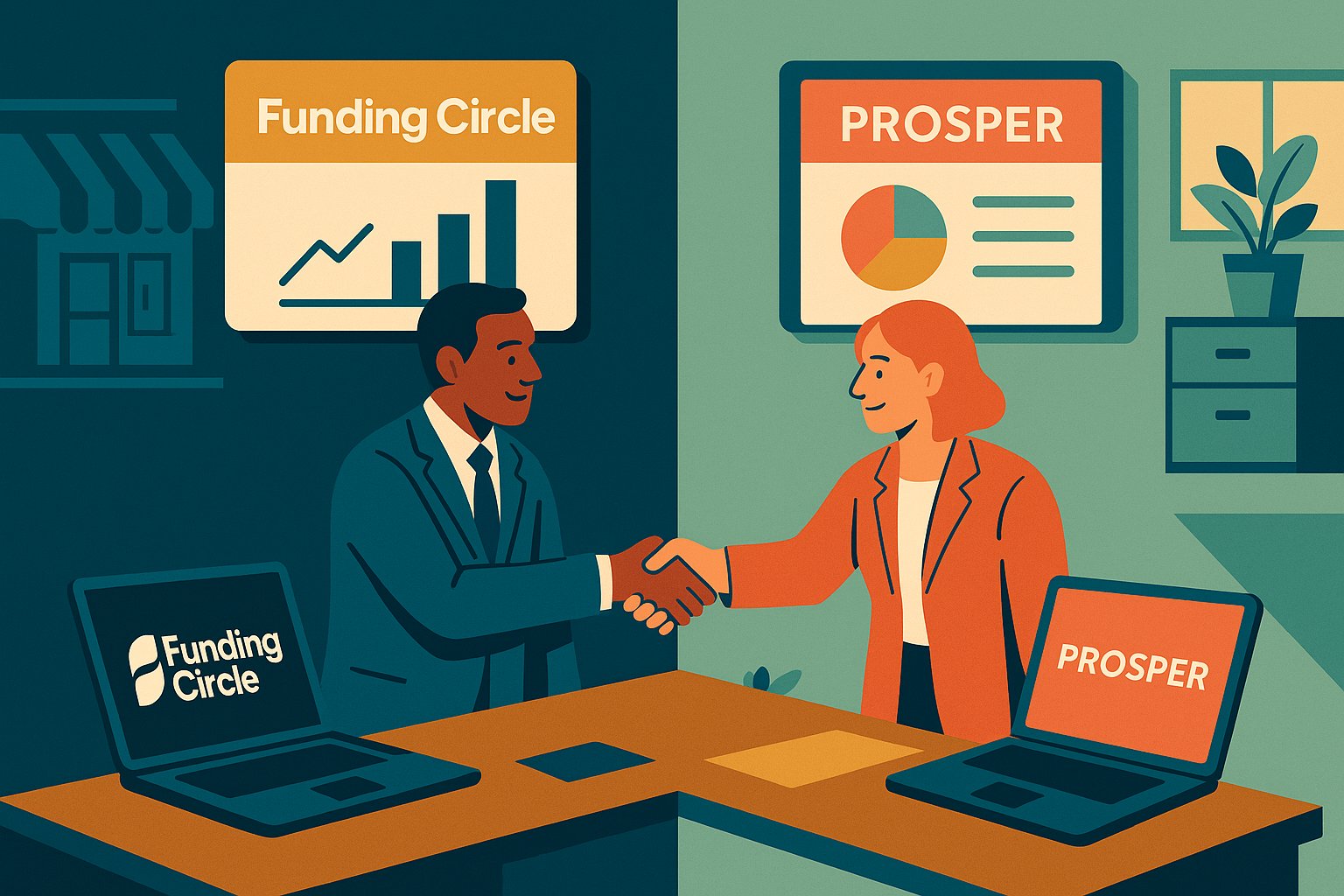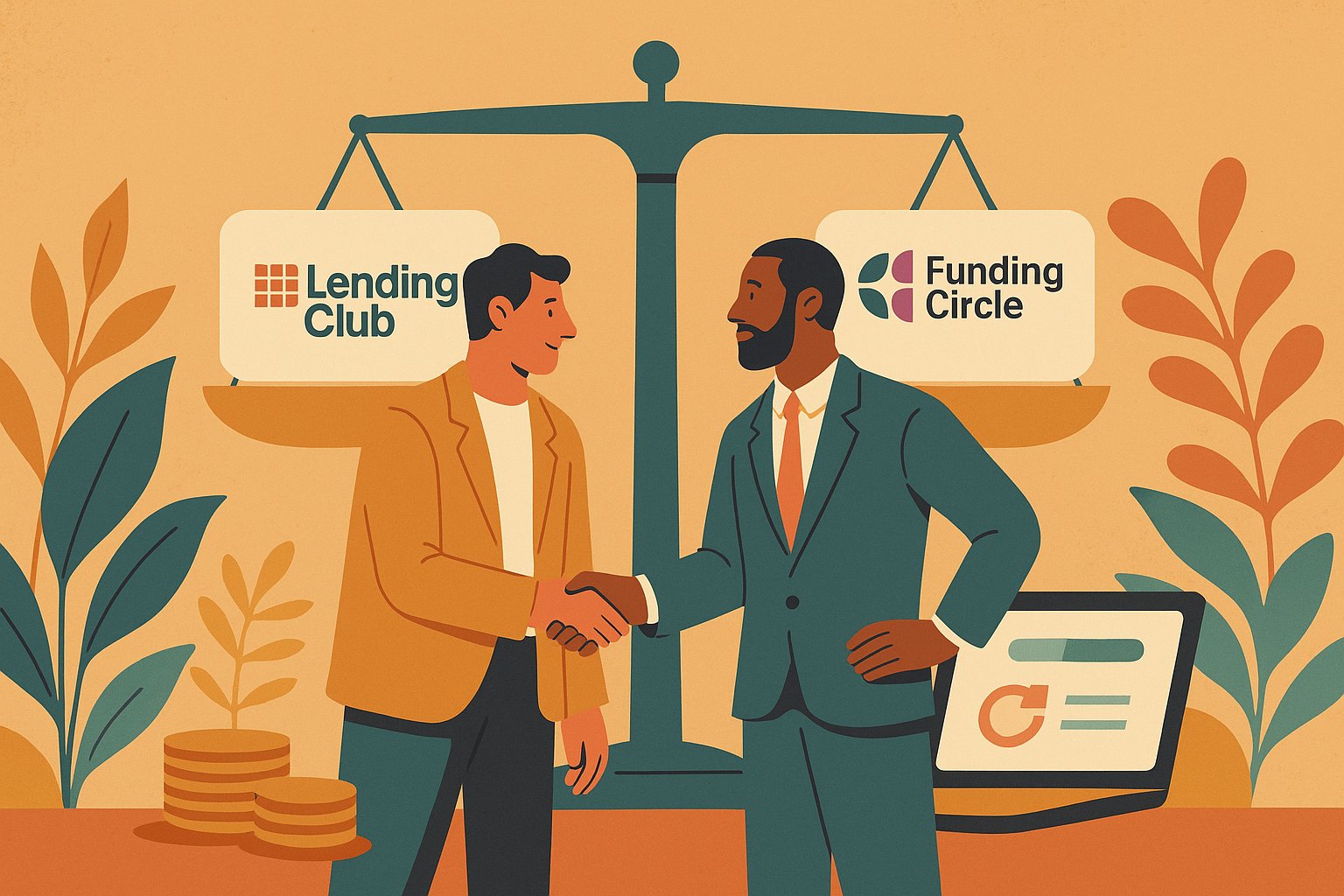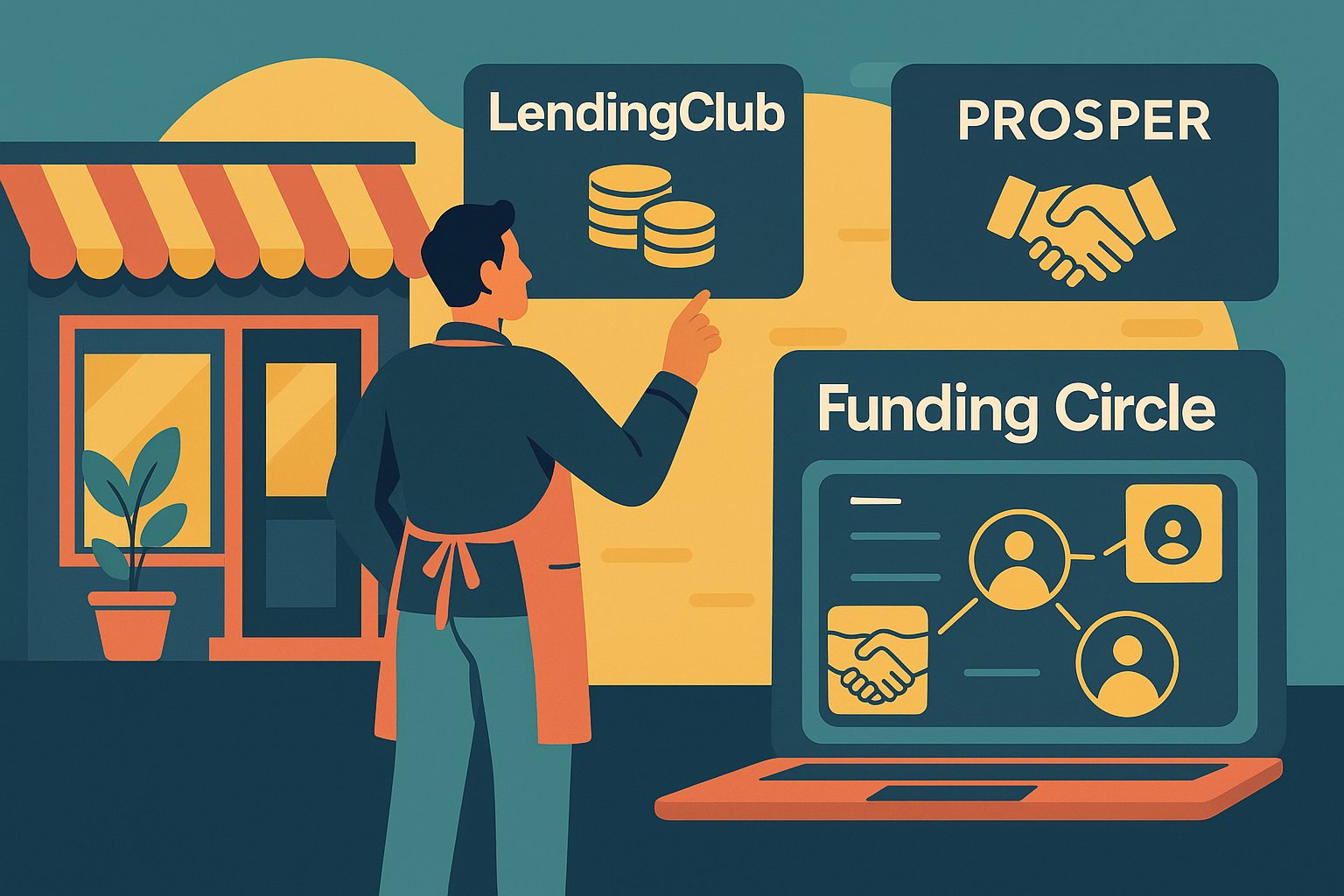A Fresh Look at Funding Opportunities for Established Enterprises
Securing the right financing can feel like finding a needle in a haystack—especially for established businesses that need more than just a quick cash infusion. Two major players in the peer-to-peer lending space, Funding Circle and Prosper, have gained credibility and traction in recent years. Yet, which platform truly caters to the needs of mature, well-established companies seeking growth capital? In this article, we dive headfirst into a detailed comparison of Funding Circle versus Prosper, dissecting their lending philosophies, application processes, cost structures, and support systems to help seasoned business owners make an educated choice that aligns with their long-term vision.
Behind the Scenes of Funding Circle’s Business Lending Model
Funding Circle emerged with a clear mission: to level the playing field for small and medium-sized businesses that historically struggled to access affordable bank loans. Rather than positioning itself as a simple matchmaking service between individual borrowers and investors, Funding Circle operates as a full-scale marketplace lender, connecting accredited investors and institutions directly with businesses. For established enterprises, this means access to deeper pools of capital at competitive rates. Since its inception, Funding Circle has lent billions of dollars to businesses across the United States, drawing on a robust underwriting infrastructure that evaluates company performance metrics, cash flow history, and industry-specific risk factors.
Institutional investors appreciate Funding Circle’s rigorous credit assessment process, which translates to more predictable loan performance and consistent funding availability. Mature businesses stand to benefit from more substantial loan amounts—often ranging from $25,000 up to $500,000 or more—and a range of term lengths extending from six months to five years. By focusing exclusively on business lending (as opposed to consumer or personal loans), Funding Circle has engineered tools and features that are finely tuned to the needs of established companies: customized repayment schedules, transparent fee structures, and dedicated account managers. The platform’s emphasis on data-driven credit decisions and scalable loan offerings has earned it a reputation as a reliable source of growth capital for businesses well beyond their startup phase.
Navigating Prosper’s Approach to Business Financing
Prosper’s origin story began as one of the earliest peer-to-peer lending pioneers, initially focusing on personal loans for consumers. Over time, the company recognized that its marketplace could serve a broader audience, including small businesses. However, Prosper remains fundamentally a consumer-focused platform, which means that business loan offerings tend to be more limited and packaged differently compared to specialized lenders. When established businesses apply through Prosper, they almost always do so under the umbrella of collateralized consumer credit or personal loan products—leveraging a business owner’s personal credit profile rather than full-scale business financials.
This structure carries certain advantages: borrowers with strong personal credit histories may find slightly faster application turnaround times on Prosper, and the platform’s well-honed risk models can sometimes edge out competitors in terms of lower interest rates for prime borrowers. But for businesses that require larger sums—those exceeding $50,000—Prosper’s typical funding ceiling of around $40,000 to $50,000 can feel restrictive. Additionally, Prosper’s reliance on individual investors means that loan availability can fluctuate depending on market sentiment. In contrast, Funding Circle’s larger institutional backing offers a steadier capital source. Nevertheless, Prosper has made strides in refining its small business loan vertical, introducing new underwriting parameters that consider business revenue and time in operation. Still, for well-established companies seeking multi-year financing at scale, Prosper’s offerings often occupy a narrower niche than those of a dedicated business lender.
Delving into Interest Rates and Fee Structures
One of the most critical factors influencing the decision between Funding Circle and Prosper revolves around cost: specifically, interest rates and associated fees. Funding Circle advertises competitive annual percentage rates (APRs) that typically span from the mid-single digits into the mid-teens, depending on creditworthiness, time in business, and revenue history. Importantly, Funding Circle levies a one-time loan origination fee—usually between 3.0% and 6.0% of the total loan amount—that is deducted upfront from the disbursed funds. Many borrowers appreciate the transparency of this fee, as it is clearly disclosed during the application process and does not change over the loan term.
Prosper’s APRs, meanwhile, can range from the high single digits through the mid-twenties, again influenced by the borrower’s credit score and the perceived risk in the market. Prosper’s platform charges a slightly different origination fee—around 2.4% to 5.0%—and includes a late fee structure that can escalate if payments are missed. Notably, Prosper’s APRs can fluctuate more significantly for borrowers with borderline credit profiles, because the platform’s peer-driven marketplace may tighten lending when investor demand softens. For established businesses with solid credit and consistent revenue, Prosper might still offer competitive rates for smaller loan sizes, but the potential variability and smaller funding limits make funding costs less predictable.
Conversely, Funding Circle’s reliance on institutional capital insulates borrowers from dramatic rate swings. Businesses that require larger sums—say, $200,000 to $300,000—often see more favorable APRs on Funding Circle because the underwriting model places substantial weight on cash flow and historical performance. In many cases, a well-established business with strong financials can achieve a single-digit APR through Funding Circle, provided it meets key criteria such as annual revenue thresholds (commonly above $150,000) and profitability benchmarks. Ultimately, comparing both APR ranges side by side in real-time quotes is essential, but mature businesses frequently find Funding Circle’s structure more cost-effective for larger financing needs.
Application Process: Which Path Is Smoother?
For an established business, time is money—and the speed of application approval and funding disbursement can make all the difference. Funding Circle’s online application is designed for businesses with at least two years in operation and a minimum annual revenue (often around $150,000). Applicants are asked to provide comprehensive financial statements, bank statements, business tax returns, and details about ownership. The underwriting team then leverages automated risk assessment tools alongside manual review by credit specialists, yielding an approval decision within a few days. Funding Circle’s transparent dashboard allows business owners to track progress in real time, submit additional documents when needed, and monitor the expected funding date. Once approved, funds are typically deposited within two to three business days.
Prosper’s application process, by comparison, is streamlined to favor personal credit evaluation. While applicants may be asked to supply some basic business information—such as annual revenue and years in operation—the core underwriting centers around the personal credit score of the business owner, their debt-to-income ratio, and the individual’s credit history. Consequently, the Prosper application can often be completed in under 10 minutes, and conditional loan offers sometimes arrive within a day. Funding disbursement may occur as quickly as two business days after acceptance, assuming all documentation is satisfactory. Nevertheless, for established businesses seeking to project a professional image and establish a clear line of separation between personal and business finances, the Prosper path can feel less tailored. Moreover, Prosper’s smaller loan caps may necessitate multiple applications if a company needs more capital, potentially complicating the funding timeline.
Criteria for Eligibility and Approval Odds
Eligibility requirements form the bedrock of any lending decision. Funding Circle’s thresholds for established businesses generally include having been in operation for at least 24 months, achieving annual revenue of at least $150,000, and maintaining a healthy debt-to-income ratio. The platform also evaluates industry risk, location, and ownership structure to gauge long-term viability. Consequently, well-established companies that have demonstrated consistent growth and profitability often breeze through Funding Circle’s initial screening. However, companies with irregular cash flow—common in seasonal businesses—or startups still ramping to scale may find themselves ineligible.
In contrast, Prosper’s eligibility standards hinge primarily on the personal credit profile of the applicant. Applicants must be U.S. citizens or permanent residents, at least 18 years old, and possess a minimum credit score (often around 640). While Prosper does allow business owners to apply for loans ostensibly for business purposes, its underwriting does not rigorously assess business financials. An established business whose owner has a stellar personal credit score can typically qualify for a Prosper loan, but the mismatch between loan size and business financing needs often limits Prosper’s appeal. Businesses with strong revenue yet average personal credit will likely see higher interest rates on Prosper or may be rejected outright. Meanwhile, Funding Circle’s business-centric focus rewards companies that emphasize growth metrics and operational stability.
Repayment Flexibility and Term Lengths Explored
One of the key factors that sets Funding Circle apart for established enterprises is the breadth of repayment options and term lengths. Funding Circle offers terms ranging from six months to five years, allowing business owners to tailor monthly payments to align with projected cash flow. Early repayment is permitted without penalty, which is a boon for businesses that experience a sudden influx of revenue or decide to allocate capital more efficiently. Additionally, the platform’s customer support team is well-equipped to discuss alternative repayment structures—especially for companies navigating temporary downturns—ensuring that businesses do not face undue stress if adjustments become necessary.
Prosper, on the other hand, generally offers term lengths between three and five years, but because the loans are technically personal or consumer obligations, the platform’s repayment structure is less forgiving when a business faces seasonal dips or unexpected expenses. Prepayment is also allowed, yet depending on market conditions and the individual credit profile, Prosper may impose a graduated fee schedule for early payoff. This can deter established business owners who want more flexibility to allocate funds toward expansion or investment opportunities as they arise. For companies that need a short-term bridge loan—perhaps to capitalize on a fleeting opportunity—Prosper’s three-year maximum term might suffice. However, businesses seeking a longer runway to execute multi-year growth strategies typically prefer Funding Circle’s more adaptable loan framework.
Customer Experience and Support Insights
A robust lending relationship extends well beyond the moment of disbursement; it thrives on ongoing support, transparent communication, and proactive account management. Funding Circle has invested heavily in building a dedicated Business Success Team—specialized account managers tasked with guiding borrowers from application through repayment. These managers offer periodic check-ins, financial health assessments, and customized advice on structuring future borrowings. For established businesses, having a single, knowledgeable point of contact instills confidence that their lender truly understands their industry nuances and unique operational challenges.
Prosper’s model, by design, does not cater to business-specific support in the same way. Borrowers interact primarily through an online portal, and customer service is often geared toward general loan account inquiries rather than industry-specific guidance. While Prosper does provide comprehensive online resources—articles, calculators, and FAQs tailored to consumer credit—there is less of a personalized touch for businesses that might need strategic advice on timing borrowed capital for maximum ROI. Consequently, established companies that value a consultative lender relationship often gravitate toward Funding Circle, where the promise of specialized support translates into a more collaborative partnership over the loan lifecycle.
Real World Impact: Case Studies and Success Stories
Numbers tell a compelling story, but narratives breathe life into them. Consider a midwestern manufacturing firm that, after eight years of steady growth, needed $250,000 to upgrade its production line and secure a pivotal contract. The company approached Funding Circle, received a competitive rate, and completed the application process within a week. Within ten business days, the new equipment was in place, production capacity tripled, and revenue climbed by 30 percent in under six months. The business owner credits Funding Circle’s efficient underwriting and flexible repayment options for enabling rapid expansion without burdening the company’s cash reserves.
By contrast, a boutique design agency with $80,000 in annual revenue explored Prosper for a $40,000 injection to invest in specialized software licenses and a marketing blitz. Although the personal credit score of the agency owner qualified the company for Prosper’s loan, the higher interest rate and relatively short three-year term meant monthly payments consumed a larger portion of monthly cash flow than anticipated. The agency ultimately decided to accept a slightly smaller loan from Funding Circle—despite a lengthier documentation process—because the lower APR and five-year term provided breathing room during the agency’s off-season months.
These anecdotes illustrate a broader trend: established enterprises needing larger sums and predictable repayment schedules often find more value with Funding Circle, whereas smaller operations or those with exceptional personal credit histories might still benefit from Prosper’s streamlined approach. Yet the scale and depth of Funding Circle’s case studies—spanning hundreds of successful SMB partnerships—build a compelling narrative that resonates with businesses striving for sustainable, long-term growth.
Making the Decision: Key Takeaways for Established Businesses
So, which platform should an established business choose? If your company has at least two years of solid financial performance, annual revenue comfortably north of $150,000, and needs more than $50,000 to execute a growth initiative, Funding Circle’s tailored business lending model is designed precisely for you. Its competitive APRs, flexible term lengths, and dedicated business account managers underscore a commitment to the unique challenges of seasoned enterprises. On the flip side, if you’re a business owner who prefers minimal paperwork, has stellar personal credit, and needs a relatively modest infusion of funds under $50,000, Prosper’s streamlined consumer lending engine could serve as a quick stopgap to fund near-term expenses or smaller-scale expansions. Ultimately, aligning your business’s funding goals, desired loan size, and tolerance for documentation complexity with the strengths of each platform will guide you toward the right choice.
Inspiring Future Growth with the Right Lending Partner
In today’s dynamic business landscape, the ability to act swiftly on growth opportunities often separates thriving enterprises from those that plateau. Choosing the optimal lending platform is more than a transactional decision—it is a strategic partnership that can shape the trajectory of your company’s future. Funding Circle’s robust infrastructure and industry-specific focus offer established businesses a clear path to sustainable expansion, while Prosper’s consumer-centric model caters to entrepreneurs seeking nimble, lower-dollar solutions. As you weigh rates, fees, term flexibility, and support mechanisms, keep your long-term vision at the forefront. By selecting the platform that best aligns with your operational needs and financial objectives, you’re not just securing capital; you’re laying the foundation for enduring success.




